
What Is Repressed Anger? Its Causes, Symptoms & How to Deal with It?
We all feel anger at some point, but what happens when that anger is pushed down and never dealt with?
This is what we call repressed anger—a silent, often unnoticed emotion that can linger beneath the surface, affecting our mental and physical health.
Unlike anger that’s expressed, repressed anger stays hidden, sometimes for years, and can lead to stress, anxiety, or even chronic health issues.
You might be surprised to learn just how common this is. In the U.S., millions of people struggle with repressed anger without even realizing it. Studies suggest that nearly 1 in 5 Americans may experience it at some point in their lives.
Whether it’s due to societal pressures, fear of conflict, or simply not knowing how to process emotions, repressed anger can quietly take a toll on relationships, work, and overall well-being.
In this blog, we’ll explore what repressed anger looks like, why it happens, and how it impacts your life. More importantly, we’ll share practical steps to help you recognize and address it in healthy ways. If you’ve ever felt like your emotions are bottled up or unexplained, this is for you!
What Is Repressed Anger?
Repressed anger occurs when anger is not addressed and avoided. It can lead to self-harm, poor self-esteem, self-sabotaging tendencies, physical pains, and relationship issues.
Repressed anger is a powerful and often intense emotion that has been pushed down, buried, or denied rather than expressed healthily. Repressed anger occurs when we consciously or unconsciously stifle our angry feelings, bottling them up inside.
Key Characteristics of Repressed Anger
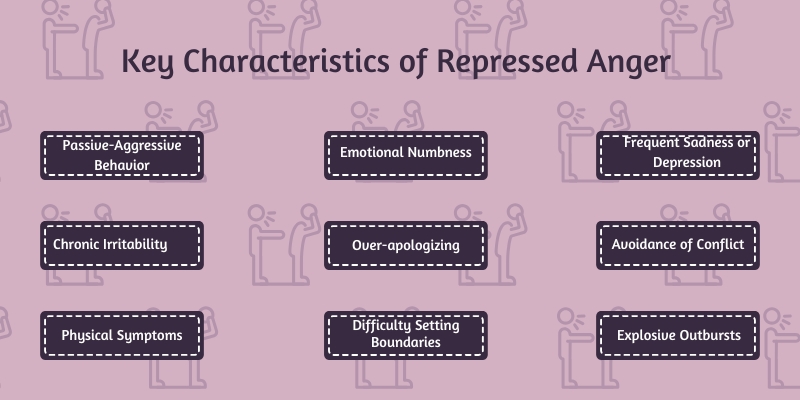
Repressed anger isn’t always easy to spot because it doesn’t show up in obvious ways like yelling or outbursts. Instead, it often hides behind other behaviors or emotions, making it harder to recognize.
Understanding the key characteristics of repressed anger can help you identify it in yourself or others, which is the first step toward addressing it.
Here are some detailed signs and behaviors commonly associated with repressed anger:
- Passive-Aggressive Behavior: Instead of expressing anger directly, you might make sarcastic comments, give silent treatment, or subtly sabotage situations.
- Chronic Irritability: Small things that wouldn’t normally bother you suddenly feel overwhelming, leaving you constantly on edge.
- Physical Symptoms: Repressed anger can manifest as headaches, muscle tension, digestive issues, or even high blood pressure.
- Emotional Numbness: You might feel disconnected from your emotions or struggle to identify what you’re truly feeling.
- Over-apologizing: Constantly saying sorry, even when it’s not your fault, can be a sign of avoiding conflict or suppressing anger.
- Difficulty Setting Boundaries: You may struggle to say no or stand up for yourself, leading to resentment that builds over time.
- Frequent Sadness or Depression: Unexpressed anger can turn inward, leading to feelings of hopelessness or low self-esteem.
- Avoidance of Conflict: You go out of your way to avoid arguments or difficult conversations, even when they’re necessary.
- Explosive Outbursts: Occasionally, repressed anger can bubble over in sudden, intense reactions that seem disproportionate to the situation.
Recognizing these characteristics is crucial for addressing repressed anger. By understanding how it shows up, you can take steps to process and release it in healthier ways.
Causes & Triggers of Repressed Anger
Repressed anger doesn’t just appear out of nowhere—it often stems from deep-rooted causes and specific triggers. Understanding where it comes from can help you uncover why you might be holding onto anger and how to begin addressing it.
Whether it’s childhood experiences, societal expectations, or ongoing stressors, the reasons behind repressed anger are as varied as the people who experience it.
Here are some common causes and triggers of repressed anger:
Causes of Repressed Anger
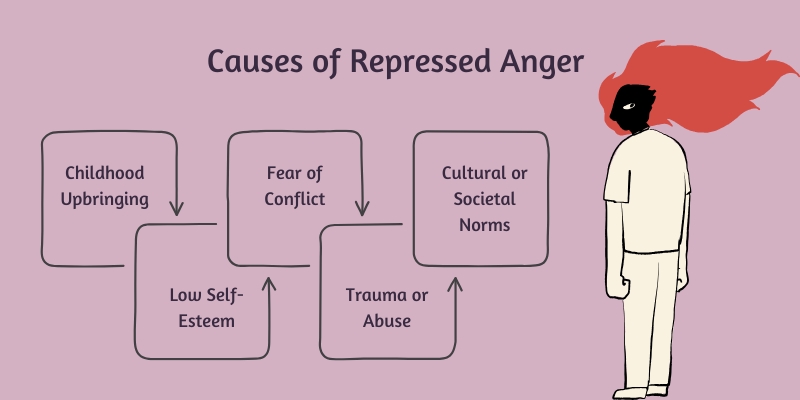
- Childhood Upbringing: Growing up in an environment where expressing anger was discouraged or punished can teach you to suppress it.
- Fear of Conflict: If you’re afraid of confrontation or worried about how others will react, you might push your anger down to avoid tension.
- Cultural or Societal Norms: Some cultures or communities emphasize being “nice” or “polite,” making it harder to express anger openly.
- Low Self-Esteem: Feeling unworthy or insecure can lead to bottling up emotions, including anger, because you don’t feel entitled to express them.
- Trauma or Abuse: Past experiences of trauma or abuse can make anger feel unsafe to express, leading to repression.
Repressed Anger Triggers
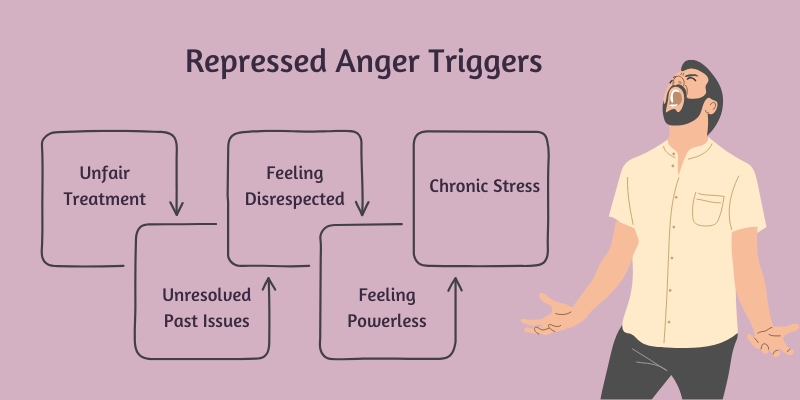
- Unfair Treatment: Being treated unfairly at work, in relationships, or in social situations can spark anger that gets buried instead of addressed.
- Feeling Disrespected: When your boundaries are ignored or your feelings are dismissed, it can lead to anger that you might not feel comfortable expressing.
- Chronic Stress: Ongoing stress from work, finances, or personal life can build up, making it harder to process emotions like anger.
- Unresolved Past Issues: Old wounds or unresolved conflicts can resurface, triggering anger that you thought you had moved past.
- Feeling Powerless: Situations where you feel like you have no control or voice can lead to anger that gets repressed because it feels pointless to express.
By identifying the causes and triggers of repressed anger, you can start to understand its roots and take steps toward healthier emotional expression. Recognizing these patterns is the first step to breaking free from the cycle of repression.
Signs of Repressed Anger
Repressed anger often flies under the radar because it doesn’t always look like typical anger. Instead of explosive outbursts, they show up in subtle, sometimes confusing ways—both emotionally and physically.
Recognizing the signs of repressed anger is crucial because it can silently affect your mental health, relationships, and even your physical well-being.
If you’ve ever felt like something is “off” but can’t quite put your finger on it, repressed anger might be the culprit.
Here are some detailed signs to watch for:
Emotional Signs of Repressed Anger
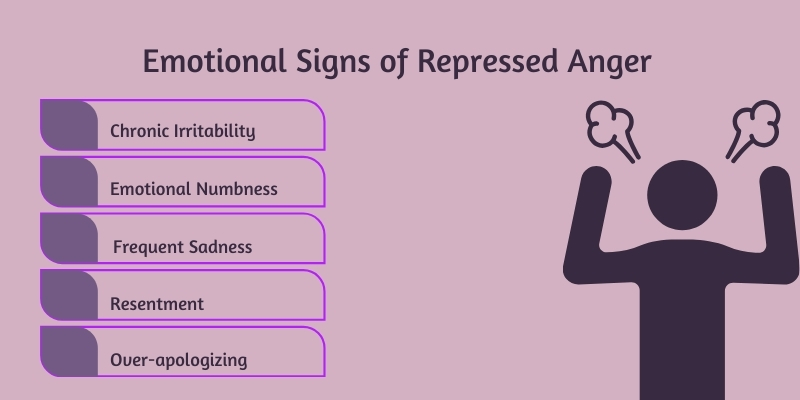
- Chronic Irritability: Feeling annoyed or frustrated over small, everyday things that wouldn’t normally bother you.
- Emotional Numbness: Struggling to connect with your emotions or feeling like you’re “just going through the motions.”
- Frequent Sadness or Depression: Unexpressed anger can turn inward, leading to feelings of hopelessness or low self-esteem.
- Resentment: Holding onto grudges or feeling bitter toward people or situations, even if you don’t express it outwardly.
- Over-apologizing: Constantly saying sorry, even when you’ve done nothing wrong, as a way to avoid conflict or disapproval.
Behavioral Signs of Repressed Anger
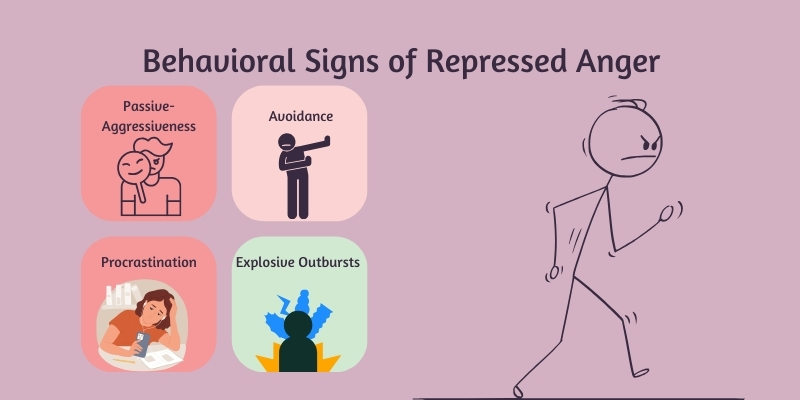
- Passive-Aggressiveness: Indirectly expressing anger through sarcasm, backhanded compliments, or subtle sabotage.
- Avoidance: Steering clear of conflict or difficult conversations, even when they’re necessary.
- Procrastination: Putting off tasks or responsibilities as a way to resist or rebel against expectations.
- Explosive Outbursts: Occasionally, repressed anger can surface in sudden, intense reactions that seem disproportionate to the situation.
Physical Signs of Repressed Anger
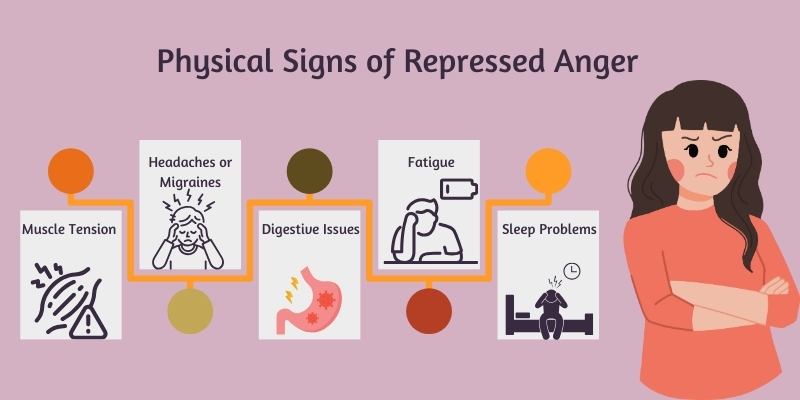
- Muscle Tension: Tightness in your jaw, shoulders, or neck, often from unconsciously clenching your body.
- Headaches or Migraines: Stress from repressed anger can manifest as frequent headaches.
- Digestive Issues: Stomachaches, nausea, or other gut problems can be linked to unprocessed emotions.
- Fatigue: Feeling constantly drained, even after rest, because holding onto anger takes a lot of energy.
- Sleep Problems: Difficulty falling asleep, staying asleep, or experiencing restless nights due to unresolved emotions.
Recognizing these signs is the first step toward addressing repressed anger. By becoming aware of how it shows up in your life, you can start to take steps to process and release it in healthier ways.
Symptoms of Repressed Anger
Repressed anger, like a hidden toxin, can silently erode your well-being and quality of life. Here are the main negative effects of repressed anger on an individual’s physical, mental, emotional, and social well-being.
Impact on Physical Health
Repressed anger is not solely an emotional burden; it also takes a toll on your physical health. Chronic stress from anger can lead to various issues, including high blood pressure, heart problems, and a weakened immune system.
The long-term physical strain from repressed anger can increase the risk of severe health conditions, affecting overall quality of life.
Influence on Mental Health
Mental health bears a significant brunt from repressed anger. It can lead to feelings of anxiety and depression as the emotional pressure builds within. The continuous repression of anger exacerbates these conditions, making it harder to manage and recover from them.
Additionally, individuals with repressed anger are at an increased risk of developing addictions as they may turn to substances or unhealthy behaviors as a coping mechanism.
Impaired Relationships, Communication, and Workplace Challenges
Repressed anger can significantly hinder your interactions with others. It often leads to communication difficulties as you struggle to express your needs and feelings openly and honestly.
It can lead to anger at the workplace or ruin your relationship. In a relationship, anger can result in misunderstandings and unaddressed conflicts. In the workplace, it might lead to challenges in collaboration and productivity.
Overall Toll on Quality of Life
The sum of these effects dramatically burdens your overall quality of life. Living with repressed anger can lead to a life marked by physical ailments, emotional turmoil, damaged relationships, and unfulfilled potential. It’s like carrying a weight that grows heavier with time, hindering your ability to enjoy a whole and healthy life.
Recognizing these negative effects is the first step in addressing repressed anger and mitigating its impact on your life. By understanding the toll it can take on your physical and mental health, relationships, and quality of life, you can begin to work towards healthier anger expression and emotional well-being.
If you experience these symptoms on a frequent basis, it is time to get the proper diagnosis and then focus on management strategies.
15 Strategies to Manage Repressed Anger
Repressed anger can feel like a heavyweight, but the good news is that it doesn’t have to stay buried forever. With the right tools and strategies, you can learn to process and release it in healthy, constructive ways.
These 15 strategies are designed to help you manage repressed anger, improve your emotional well-being, and build healthier relationships. Let’s dive into each one and explore how you can implement them in your daily life.
1. Acknowledge and Accept Your Anger
Acknowledging and accepting your anger is the first step toward managing it effectively. Many people suppress anger because they feel it’s “wrong” or “unacceptable,” but anger is a natural emotion that deserves to be recognized.
How to Implement
- Pause and check in with yourself when you feel upset. Ask, “Am I feeling angry right now?”
- Remind yourself that anger is a valid emotion and doesn’t make you a bad person.
- Practice self-compassion by saying, “It’s okay to feel this way. I’m allowed to be angry.”
How It Helps
- Reduces the tendency to suppress or deny your emotions.
- Creates a foundation for healthier emotional processing.
- Prevents anger from building up and causing long-term stress or resentment.
2. Identify the Source of Anger
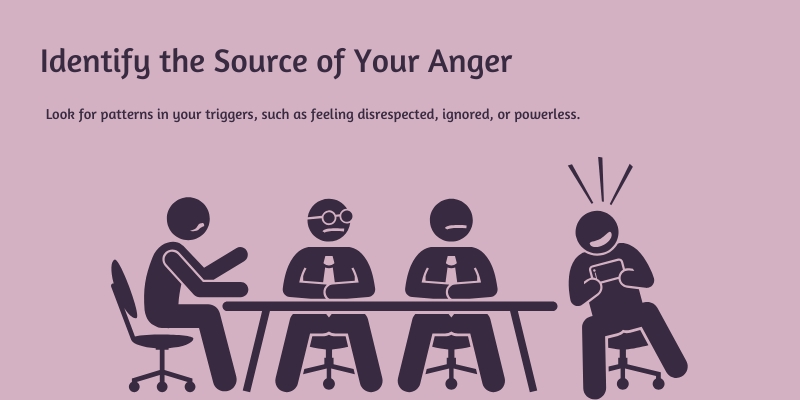
Understanding what triggers your anger is crucial for addressing it constructively. Often, repressed anger stems from unresolved issues or unmet needs.
How to Implement
- Reflect on recent situations where you felt upset or frustrated. Ask yourself, “What specifically made me angry?”
- Look for patterns in your triggers, such as feeling disrespected, ignored, or powerless.
- Journal about your feelings to gain clarity on the root causes of your anger.
How It Helps
- Provides insight into the underlying issues that fuel your anger.
- Helps you address the root cause rather than just the symptoms.
- Empowers you to take proactive steps to resolve conflicts or set boundaries.
3. Practice Self-Awareness
Self-awareness is the foundation of managing repressed anger. It involves tuning into your emotions and understanding what triggers your anger.
How to Implement
- Spend a few minutes each day reflecting on your emotions. Ask yourself, “What am I feeling right now?”
- Keep a journal to track your moods and identify patterns in your anger.
- Practice mindfulness by observing your thoughts and feelings without judgment.
How It Helps
- Helps you recognize repressed anger before it builds up.
- Encourages emotional honesty and reduces the tendency to suppress feelings.
- Provides clarity on what situations or people trigger your anger.
4. Express Anger Constructively
Expressing anger in a healthy way prevents it from being bottled up and causing long-term harm.
How to Implement
- Use “I” statements to communicate your feelings, such as “I feel upset when…” instead of blaming others.
- Choose a calm moment to discuss your feelings rather than reacting in the heat of the moment.
- Practice active listening to understand others’ perspectives during conflicts.
How It Helps
- Reduces the risk of aggression.
- Improves communication and strengthens relationships.
- Prevents anger from being internalized and causing stress.
5. Set Healthy Boundaries
Setting boundaries is essential for protecting your emotional well-being and preventing resentment.
How to Implement
- Clearly communicate your limits to others, such as saying no to unreasonable requests.
- Prioritize your needs and values when making decisions.
- Be consistent in enforcing your boundaries, even if it feels uncomfortable at first.
How It Helps
- Prevents others from taking advantage of you, which can lead to repressed anger.
- Reduces feelings of resentment and frustration.
- Builds self-respect and confidence.
6. Practice Mindfulness
Mindfulness helps you stay present and aware of your emotions without judgment.
How to Implement
- Spend 5-10 minutes daily focusing on your breath or practicing a body scan meditation.
- Observe your thoughts and feelings without trying to change them.
- Use mindfulness apps or guided meditations to build a consistent practice.
How It Helps
- Reduces the tendency to suppress or avoid emotions.
- Helps you stay calm and centered during stressful situations.
- Improves emotional regulation and self-control.
7. Engage in Physical Activity
Physical activity is a powerful way to release pent-up anger and stress.
How to Implement
- Choose activities you enjoy, such as running, yoga, dancing, or even brisk walking.
- Aim for at least 30 minutes of moderate exercise most days of the week.
- Use exercise as a way to clear your mind and release tension.
How It Helps
- Releases endorphins, which improve mood and reduce stress.
- Provides a healthy outlet for anger and frustration.
- Reduces physical symptoms of repressed anger, such as muscle tension.
8. Opt for an Anger Management Course
Sometimes, managing repressed anger requires more structured support than self-guided strategies can provide.
Anger management courses offer professional guidance and a safe space to explore and address your emotions.
How to Implement
- Research local or online anger management courses, such as those offered by Mastering Anger, which provide effective techniques and strategies.
- Choose between group or individual settings based on your comfort level and needs.
- Commit to attending sessions regularly and actively participating in anger management exercises and discussions.
How It Helps
- Provides a structured approach to understanding and coping with anger.
- Helps you uncover the root causes of repressed anger in a supportive environment.
- Teaches practical techniques for expressing anger constructively and managing triggers.
- Encourages accountability and progress through professional guidance and peer support.
Taking an anger management course is a proactive step toward emotional well-being. It provides you with the tools and insights needed to navigate the complex terrain of repressed anger and fosters healthier emotional expression.
9. Seek Therapy or Counseling
Professional help can provide valuable tools and insights for managing repressed anger.
How to Implement
- Research therapists who specialize in anger management or emotional health.
- Attend regular counseling sessions to explore the root causes of your anger.
- Be open and honest during therapy to get the most out of it.
How It Helps
- Provides a safe space to process and express anger.
- Helps you uncover underlying issues, such as past trauma or unresolved conflicts.
- Teaches coping strategies tailored to your needs.
10. Practice Deep Breathing
Deep breathing is a simple yet effective way to calm your body and mind.
How to Implement
- When you feel tension rising, inhale deeply for 4 counts, hold for 4 counts, and exhale for 6 counts.
- Repeat this cycle 5-10 times until you feel calmer.
- Practice deep breathing daily to build resilience to stress.
How It Helps
- Activates the parasympathetic nervous system, which promotes relaxation.
- Reduces physical symptoms of anger, such as a racing heart or tight muscles.
- Helps you regain control during emotional moments.
11. Use Creative Outlets
Creative activities provide a safe and productive way to express emotions.
How to Implement
- Channel your feelings into art, writing, music, or other creative projects.
- Set aside time each week to engage in a creative activity you enjoy.
- Use your creations as a way to explore and process your emotions.
How It Helps
- Provides a non-confrontational way to release pent-up anger.
- Encourages self-expression and emotional exploration.
- Boosts mood and reduces stress.
12. Challenge Negative Thoughts
Negative thoughts can fuel anger, but challenging them can help you regain perspective.
How to Implement
- When you notice angry or negative thoughts, ask yourself, “Is this thought true? Is there another way to look at this?”
- Replace irrational thoughts with more balanced ones, such as “I can handle this situation calmly.”
- Practice gratitude to shift your focus away from anger.
How It Helps
- Reduces the intensity of anger and prevents it from being internalized.
- Improves emotional resilience and problem-solving skills.
- Promotes a more positive outlook on life.
13. Practice Forgiveness
Forgiveness is a powerful tool for releasing anger and moving forward.
How to Implement
- Reflect on past hurts and work on letting go of grudges.
- Write a letter to the person who hurt you (even if you don’t send it) to express your feelings.
- Focus on the benefits of forgiveness, such as emotional freedom and peace of mind.
How It Helps
- Releases the emotional burden of anger and resentment.
- Improves mental and emotional well-being.
- Strengthens relationships and promotes healing.
14. Connect with Supportive People
A strong support system makes it easier to share your feelings and process anger.
How to Implement
- Spend time with friends, family, or support groups who encourage open communication.
- Share your feelings with trusted individuals who can offer empathy and advice.
- Avoid people who dismiss or invalidate your emotions.
How It Helps
- Reduces feelings of isolation and loneliness.
- Provides a safe space to express and process anger.
- Strengthens your emotional resilience and coping skills.
15. Prioritize Self-Care
Self-care is essential for maintaining emotional balance and reducing stress.
How to Implement
- Make time for activities that recharge you, such as reading, taking a bath, or spending time in nature.
- Set aside regular “me time” to focus on your needs and well-being.
- Practice good sleep hygiene, eat nutritious meals, and stay hydrated.
How It Helps
- Reduces stress and creates a healthier emotional environment.
- Improves overall mental and physical health.
- Makes it easier to process and manage anger in healthy ways.
By incorporating these strategies into your life, you can begin to manage repressed anger in a way that feels empowering and healing. Remember, it’s not about eliminating anger entirely—it’s about learning to express and process it in healthy ways.
What Does Reddit Sentiment Tell Us?
The Reddit community discussion on repressed anger highlights personal experiences, struggles, and various strategies to uncover and process deep-seated anger.
Many users describe repressing anger due to upbringing, fear of conflict, or societal conditioning, leading to emotional dysregulation, stress, and even intense anger-related dreams. Others share their difficulties in accessing and expressing their anger in a healthy way.
Key Takeaways from the Discussion
Recognizing Repressed Anger
- Many individuals suppress anger due to past trauma, societal pressure, or fear of damaging relationships.
- Repressed anger often manifests as excessive irritability, sudden bursts of unexplained rage, or even anger-filled dreams.
Challenges in Accessing Anger
- Some users shared how they struggle to feel anger at all, describing it as deeply buried.
- Fear and avoidance of confrontation can make it difficult to acknowledge or process anger.
Strategies for Releasing Repressed Anger
- Mindful Triggers: Safely recalling past situations that should have caused anger but didn’t, allowing oneself to feel the emotion.
- Physical Expression: Screaming into a pillow, hitting soft objects, throwing rocks, or engaging in intense exercise.
- Creative Outlets: Journaling, listening to angry music, dancing, or creating art to express emotions.
Therapeutic Approaches
- Somatic Therapy: Helps individuals reconnect with physical sensations of anger.
- Eye Movement Desensitization and Reprocessing (EMDR): Effective in processing deeply rooted anger.
- Pete Walker’s Inner Critic Work: Addresses self-critical thoughts that suppress emotions.
Breaking Free from Conditioning
- Many users shared their struggles with growing up in environments where anger was seen as unacceptable.
- Healing involves giving yourself permission to experience and validate anger as a natural emotion.
This discussion reflects how repressed anger can be deeply embedded and difficult to access, but with patience, mindfulness, and the right strategies, it is possible to release and process it in a healthy way.
Frequently Asked Questions (FAQs)
What is the difference between repressed and suppressed anger?
Repressed anger is unconscious—people don’t realize they’re holding it in, often due to deep-seated beliefs or past conditioning. Suppressed anger is a conscious choice to hold back anger in the moment, usually to avoid conflict or negative consequences.
Conclusion
Repressed anger doesn’t have to control your life. While it may feel overwhelming at first, understanding and addressing, it is a powerful step toward emotional freedom and healthier relationships.
By recognizing the signs, exploring the causes, and implementing practical strategies, you can begin to release the weight of unexpressed emotions and reclaim your peace of mind.
Remember, managing repressed anger isn’t about eliminating anger entirely—it’s about learning to process and express it in ways that serve you rather than harm you.
Whether it’s through self-awareness, mindfulness, creative outlets, or professional support, there are countless tools available to help you navigate this journey.
Each small step you take, from setting boundaries to practicing forgiveness, brings you closer to emotional balance and well-being.
So, take a deep breath, be patient with yourself, and start this journey today!





Thanks for such clear and detailed article which really helped me to understand the importance of repressed anger and how to manage . really appreciate your service 🙏💓
Great job.